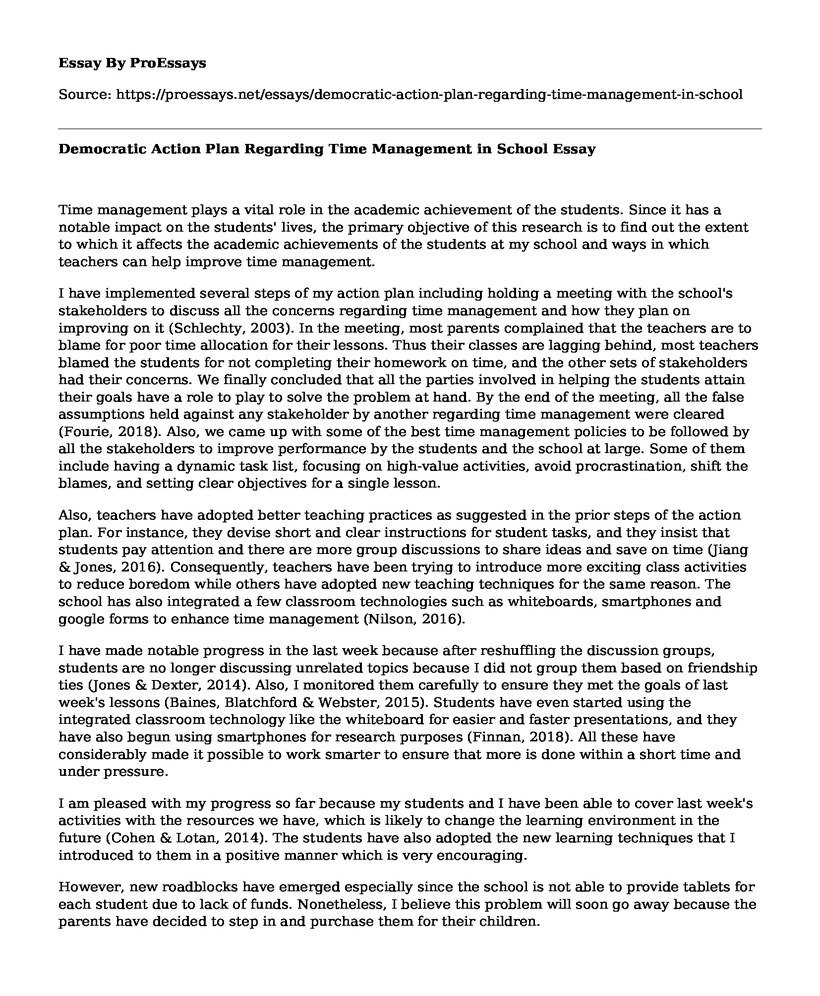Time management plays a vital role in the academic achievement of the students. Since it has a notable impact on the students' lives, the primary objective of this research is to find out the extent to which it affects the academic achievements of the students at my school and ways in which teachers can help improve time management.
I have implemented several steps of my action plan including holding a meeting with the school's stakeholders to discuss all the concerns regarding time management and how they plan on improving on it (Schlechty, 2003). In the meeting, most parents complained that the teachers are to blame for poor time allocation for their lessons. Thus their classes are lagging behind, most teachers blamed the students for not completing their homework on time, and the other sets of stakeholders had their concerns. We finally concluded that all the parties involved in helping the students attain their goals have a role to play to solve the problem at hand. By the end of the meeting, all the false assumptions held against any stakeholder by another regarding time management were cleared (Fourie, 2018). Also, we came up with some of the best time management policies to be followed by all the stakeholders to improve performance by the students and the school at large. Some of them include having a dynamic task list, focusing on high-value activities, avoid procrastination, shift the blames, and setting clear objectives for a single lesson.
Also, teachers have adopted better teaching practices as suggested in the prior steps of the action plan. For instance, they devise short and clear instructions for student tasks, and they insist that students pay attention and there are more group discussions to share ideas and save on time (Jiang & Jones, 2016). Consequently, teachers have been trying to introduce more exciting class activities to reduce boredom while others have adopted new teaching techniques for the same reason. The school has also integrated a few classroom technologies such as whiteboards, smartphones and google forms to enhance time management (Nilson, 2016).
I have made notable progress in the last week because after reshuffling the discussion groups, students are no longer discussing unrelated topics because I did not group them based on friendship ties (Jones & Dexter, 2014). Also, I monitored them carefully to ensure they met the goals of last week's lessons (Baines, Blatchford & Webster, 2015). Students have even started using the integrated classroom technology like the whiteboard for easier and faster presentations, and they have also begun using smartphones for research purposes (Finnan, 2018). All these have considerably made it possible to work smarter to ensure that more is done within a short time and under pressure.
I am pleased with my progress so far because my students and I have been able to cover last week's activities with the resources we have, which is likely to change the learning environment in the future (Cohen & Lotan, 2014). The students have also adopted the new learning techniques that I introduced to them in a positive manner which is very encouraging.
However, new roadblocks have emerged especially since the school is not able to provide tablets for each student due to lack of funds. Nonetheless, I believe this problem will soon go away because the parents have decided to step in and purchase them for their children.
The action plan is clear, precise and current but it did not consider the barriers of the proposed solution to time management. Therefore, the limitations of integrating new technology to solve the problem should be revisited to come up with their answers.
References
Baines, E., Blatchford, P., & Webster, R. (2015). The challenges of implementing group work in primary school classrooms and including pupils with special educational needs. Education 3-13, 43(1), 15-29.
Cohen, E. G., & Lotan, R. A. (2014). Designing Groupwork: Strategies for the Heterogeneous Classroom Third Edition. Teachers College Press.
Finnan, C. (2018). Accelerating the learning of all students: Cultivating culture change in schools, classrooms and individuals. Routledge.
Fourie, E. (2018). The impact of school principals on implementing effective teaching and learning practices. International Journal of Educational Management, 32(6), 1056-1069.
Jiang, H. S., & Jones, S. Y. (2016). Practical Strategies for Minimizing Challenging Behaviors in the Preschool Classroom. Dimensions of Early Childhood, 44(3), 12-19.
Jones, W. M., & Dexter, S. (2014). How teachers learn: The roles of formal, informal, and independent learning. Educational Technology Research and Development, 62(3), 367-384.
Nilson, L. B. (2016). Teaching at its best: A research-based resource for college instructors. John Wiley & Sons.
Schlechty, P. C. (2003). Inventing better schools: An action plan for educational reform. John Wiley & Sons.
Cite this page
Democratic Action Plan Regarding Time Management in School. (2022, Jul 15). Retrieved from https://proessays.net/essays/democratic-action-plan-regarding-time-management-in-school
If you are the original author of this essay and no longer wish to have it published on the ProEssays website, please click below to request its removal:
- Bounce Fitness Diversity Policy Draft Research
- Personal Statement on Supply Chain and Operational Management
- Students Speaking Skills Improvement Research Paper Example
- Essay Sample on Challenges of Generational Employees
- Levels of Literacy and Numeracy Skills in New Zealand - Essay Sample
- Making Life Decisions: Intuition and Choices - Essay Sample
- Essay Example on Overcoming Stage Fright: Learning the Art of Public Speaking







